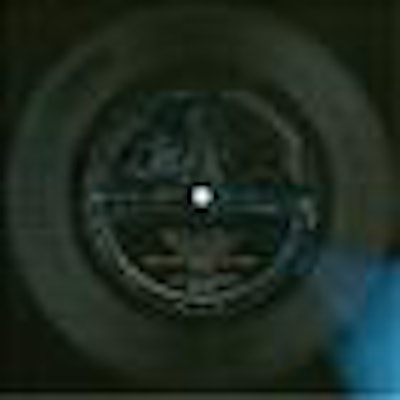
If you're tired of reading x-rays, how about spinning them instead? Old medical x-ray films were literally pressed into service to form limited-edition discs of a new single from record label Third Man Records, founded by Jack White of the band the White Stripes.
"Think of the process the same way you'd make a fresh waffle," Ben Blackwell from Third Man Records told AuntMinnie.com by email. "You put the x-ray on a hot press, and when you pull it out, the grooves have been baked in."
When asked whether the records retain the original images, he confirmed they're part of the final product.
"Once pressed, the records still have the x-ray images on them -- that's the best part," he said.
 Third Man Record's x-ray-based Flex-Ray by artist Gibby Haynes. Image courtesy of Ben Blackwell.
Third Man Record's x-ray-based Flex-Ray by artist Gibby Haynes. Image courtesy of Ben Blackwell.
The x-ray records are part of the release of a three-song, 7-inch single by artist Gibby Haynes, former lead singer of the Butthole Surfers. The single is part of the label's "Blue Series," in which artists passing through the area are invited to record a song or two at Third Man's Nashville, TN, studio, according to the label's website. The Haynes single was initially released in nonradiographic form on Valentine's Day.
The use of x-ray exams as the material for records is a first for the company, according to Blackwell, a musician originally from Detroit, who moved south in 2009 to help start up the label.
"Personally, I'd recently done a record with an art zine called Bagazine of a song my wife Malissa and I performed together," Blackwell said. "We had a friend lathe cut those on x-rays, and I was really geeked about the entire process. When that went well, I mentioned it as a possibility for doing here at Third Man."
The limited-edition radiographic versions of the Haynes single are being called Flex-Rays, a merging of the terms "flexi-disc" and "x-ray." Flexi-discs are thin, flexible records that gained popularity in the 1960s; they were often inserted into magazines or other material as a way to distribute recordings.
Flexi-discs created from x-ray material have an interesting past, particularly in the former Soviet Union. To distribute copies of smuggled Western songs, enterprising individuals in the country started pressing the recordings on old medical x-ray films, which were cheaper than other materials. These banned, underground records were known as "roentgenizdat."
"I guess my first exposure to [x-ray recording] was some years back when I'd heard that records cut on x-rays were how Western music was snuck behind the Iron Curtain back during the Cold War," Blackwell said. "The idea of using whatever material was at hand for such an important and symbolic purpose really struck me as poetic."
The Flex-Rays are being limited to 100 copies. They are being sold starting March 14 from Third Man's mobile Rolling Record Store, which is in Austin, TX, during the South by Southwest music and film festival.



















